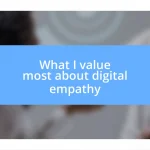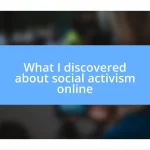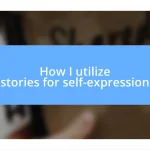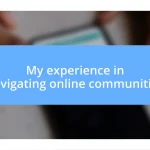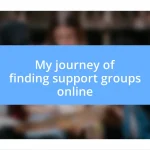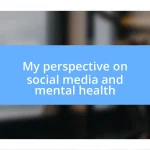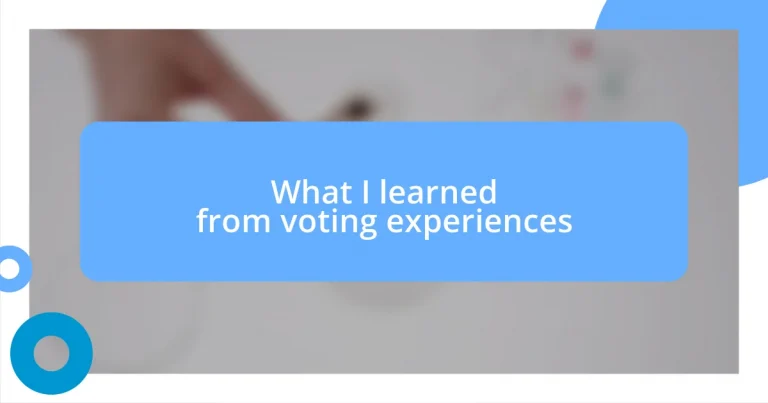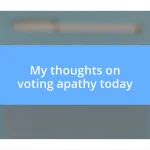Key takeaways:
- Voting serves as a powerful reminder of civic duty and the collective history of struggles for democratic rights, highlighting each vote’s significance.
- Engaging in the voting process promotes not only personal empowerment but also fosters community connection and education, essential for increasing participation.
- Overcoming challenges in voting, such as accessibility and understanding ballots, emphasizes the importance of support, empathy, and shared experiences in democracy.
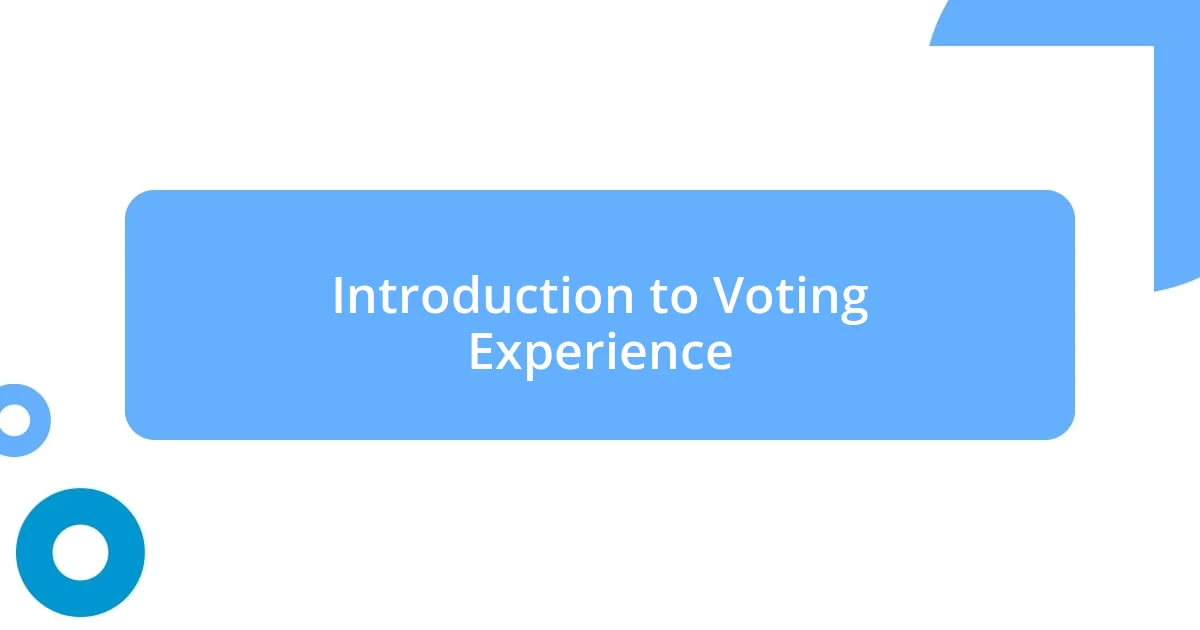
Introduction to Voting Experience
Voting isn’t just a right; it’s a deeply personal experience that can stir a whirlwind of emotions. I remember the first time I cast my ballot. Standing in line, I felt an electric mix of excitement and nervousness—was my choice truly making a difference? It’s a moment that stays with you, highlighting the power of voice within a democracy.
As I stepped into that voting booth, time seemed to pause. I could hear my heart pounding in my chest, and I vividly recall the wave of responsibility that washed over me. It struck me then: each vote represents not just an individual, but the stories and struggles of countless others who fought for the chance to be heard. Have you felt that weight as well?
Reflecting on my voting experiences, I’ve noticed how they underscore the importance of civic engagement. There’s something profoundly unifying about participating in a process where so many from different backgrounds come together with one common goal. What lessons have your voting experiences taught you about community and personal agency? For me, they reinforced the notion that every vote matters and that each election is an opportunity to shape our future together.
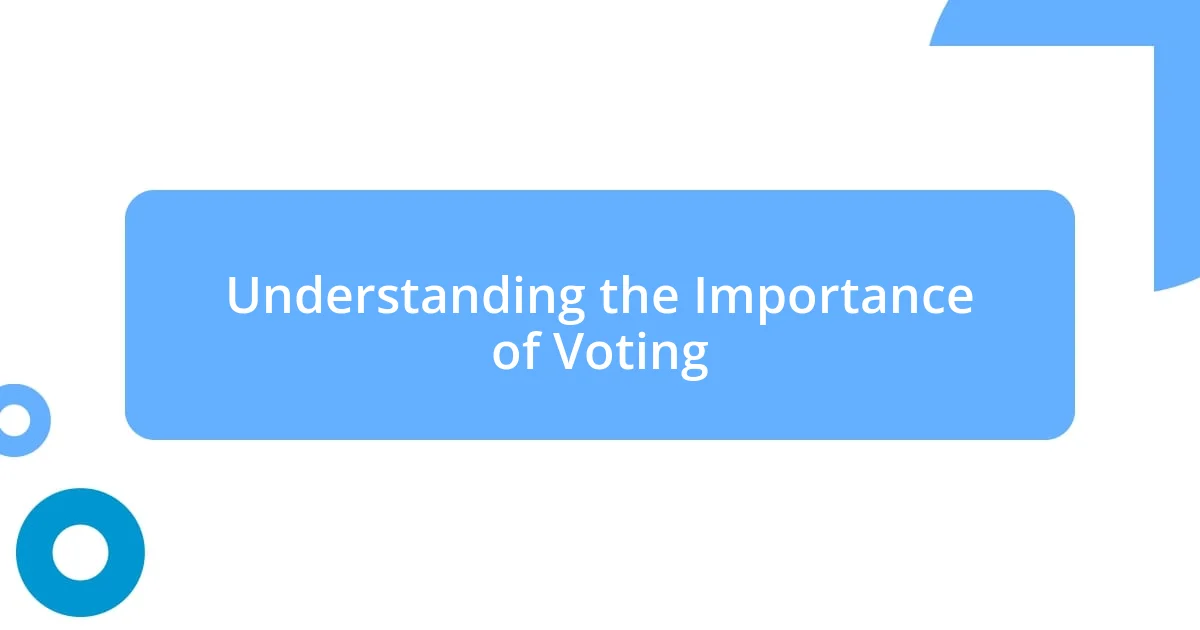
Understanding the Importance of Voting
When I think about the importance of voting, a memory jumps out at me. During one election, I stood outside the polling place and chatted with a woman beside me. She shared how her grandparents had been denied the right to vote for reasons steeped in injustice. Her passion and determination resonated with me, highlighting that every vote is a tribute to those who fought for the freedoms we enjoy today.
- Voting empowers individuals to influence the decisions that affect their lives.
- Each vote reflects the cumulative voice of a community, fostering collective strength.
- Engaging in voting is a way to honor those who sacrificed for our rights and freedoms.
- It encourages active participation in democracy, promoting accountability among elected officials.
- The act of voting can ignite conversations about important societal issues, sparking change.
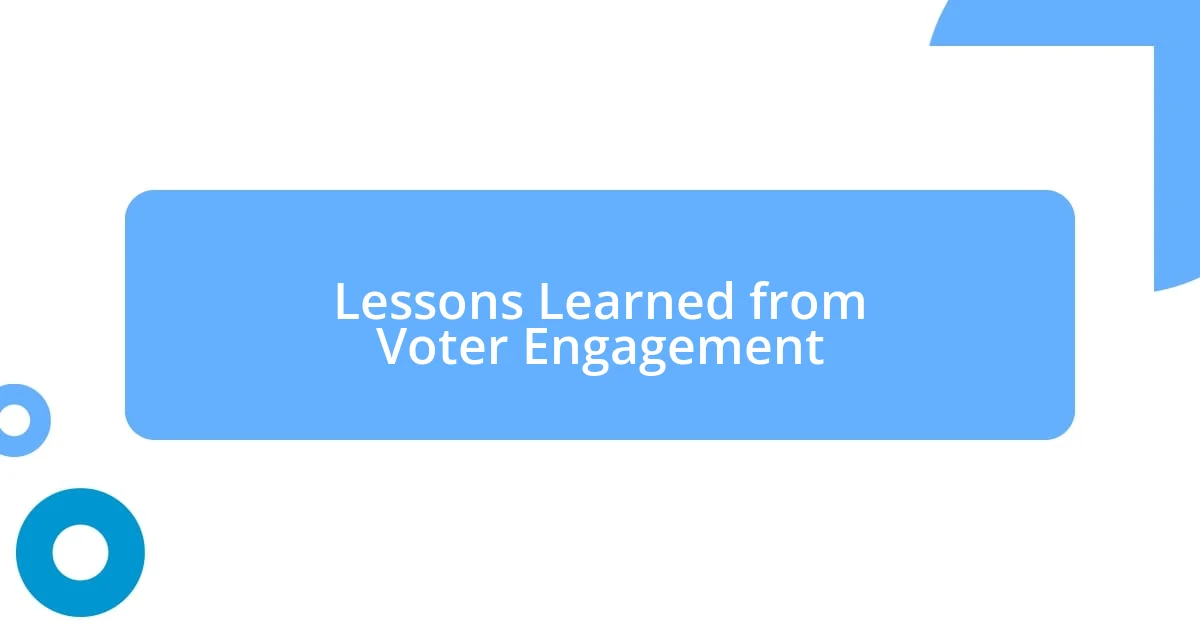
Lessons Learned from Voter Engagement
Voting is a powerful way to reflect on our perspectives and the collective history of those who came before us. I recall one instance when I helped organize a voter registration drive at my local college. Witnessing students express their passion for political change and the excitement as they signed up left a lasting impression on me. It made me realize just how vital engagement is—not only for empowering individuals but also in creating a sense of community among those with shared goals.
During another election cycle, I volunteered to help folks navigate the voting process. Some were overwhelmed, unsure of their polling locations or the details on the ballot. This experience illuminated the barriers that many face and reminded me that voter education is essential. Every interaction revealed just how crucial it is for us to support one another in understanding our rights and responsibilities as voters. Have you ever thought about how we can simplify this experience for others?
Engaging in voter initiatives also taught me the importance of listening. I remember sitting in a community forum where residents shared their concerns. Listening to their stories provided an opportunity to connect deeply with issues that might not have affected me directly. This reinforced my belief that empathy is essential in driving voter engagement. It’s a reminder that our votes stand for shared experiences and aspirations.
| Lesson | Insight |
|---|---|
| Empowerment | Voting gives individuals the power to influence their community and shape their future. |
| Community Connection | Active participation in voting fosters unification and common purpose within diverse groups. |
| Voter Education | Supporting others in understanding the voting process is key to increasing participation. |
| Empathy | Listening to community concerns enriches our understanding and drives engagement. |
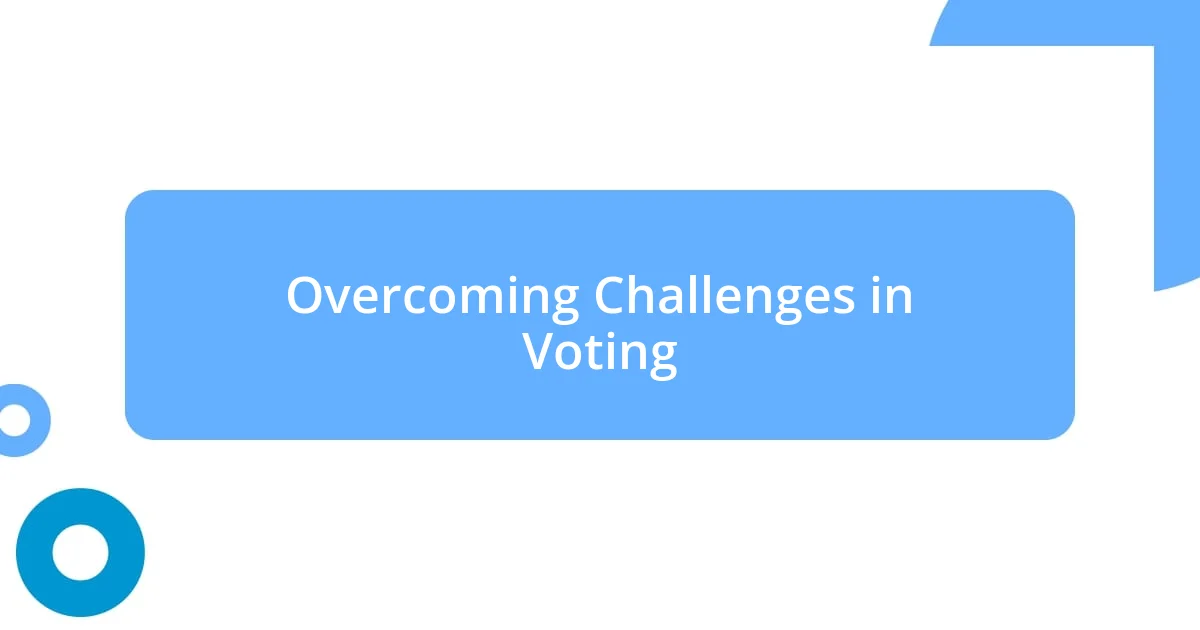
Overcoming Challenges in Voting
Over the years, I’ve faced my fair share of challenges at the polls, and one moment sticks out vividly. During a particularly chaotic election, I arrived at my polling location only to be faced with a long line and a malfunctioning machine. I could feel the frustration in the air, but instead of getting discouraged, I focused on the camaraderie around me. We started sharing stories and jokes, which transformed the wait into an unexpected moment of community bonding. Have you ever considered how connecting with others can turn a daunting experience into something memorable?
Another hurdle I encountered was understanding the intricacies of the ballot itself. The first time I voted, I was daunted by the number of candidates and measures. To prepare, I spent hours researching online, but nothing compared to having a conversation with a friend who was experienced in the process. She helped me break down the complicated language into simpler terms and gave personal insights on the candidates. This taught me that overcoming challenges often involves reaching out and sharing knowledge. Have you ever found that a simple conversation can clarify what seems overwhelming?
Lastly, accessibility remains a significant concern in voting that I’ve witnessed firsthand. I recall volunteering at a community center where many residents had mobility issues. I felt compelled to ensure they could cast their ballots without undue stress. We set up a transport system to bring them to polling places, and the gratitude I received was immeasurable. It revealed to me that when we actively help each other overcome logistical barriers, we not only empower individuals but also strengthen the fabric of our democracy. How can we further advocate for accessibility to make voting a truly inclusive event for everyone?
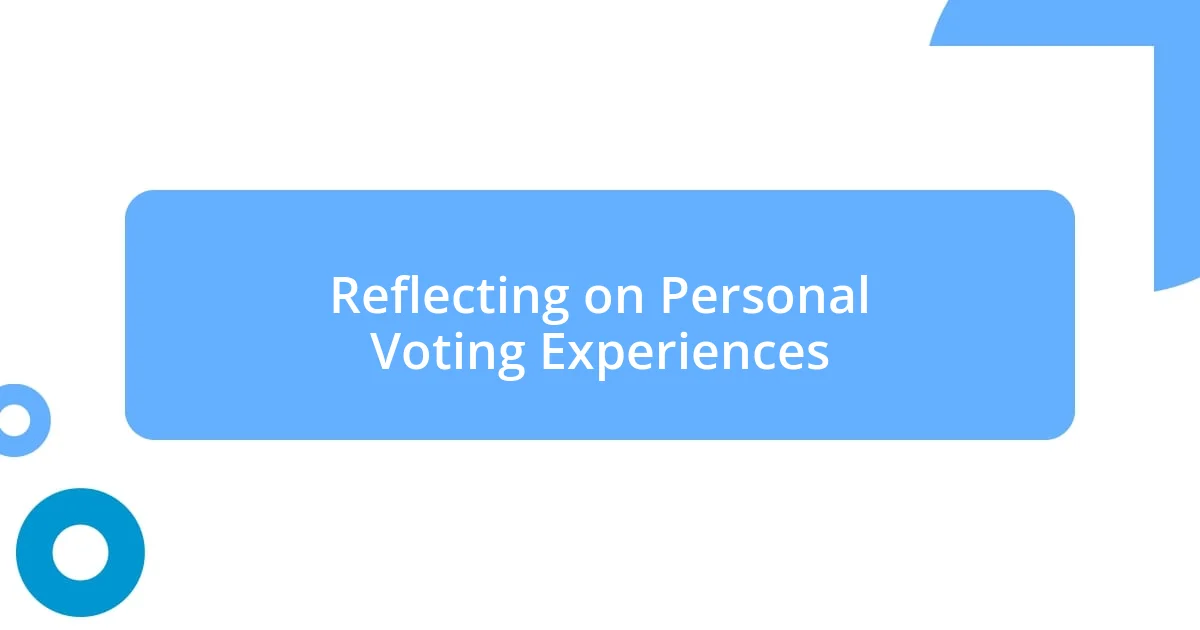
Reflecting on Personal Voting Experiences
Reflecting on my personal voting experiences, I’ve come to realize how each election has shaped my understanding of civic duty. During my first voting experience, I remember sitting in my car, grappling with a mix of excitement and anxiety. It wasn’t just about casting a vote; it felt like stepping into history, joining a long line of voices that shaped our democracy. I often wonder, does everyone feel this sense of weight when they vote?
One election, while waiting for my turn, a woman ahead of me shared her frustrations about the electoral process. Her heartfelt concerns about disenfranchisement fueled my awareness of the systemic issues we face. It was eye-opening to see how personal stories could create a collective urgency for change. Have you noticed how one conversation can spark a deeper passion for advocacy in others?
Looking back, I also cherish the moments spent with friends as we discussed our ballots. It became a ritual of sorts, where we dissected propositions and highlighted our beliefs. This camaraderie not only strengthened our friendships but also deepened our shared commitment to being informed voters. I ask you—what discussions have you had that transformed the way you view the voting process?
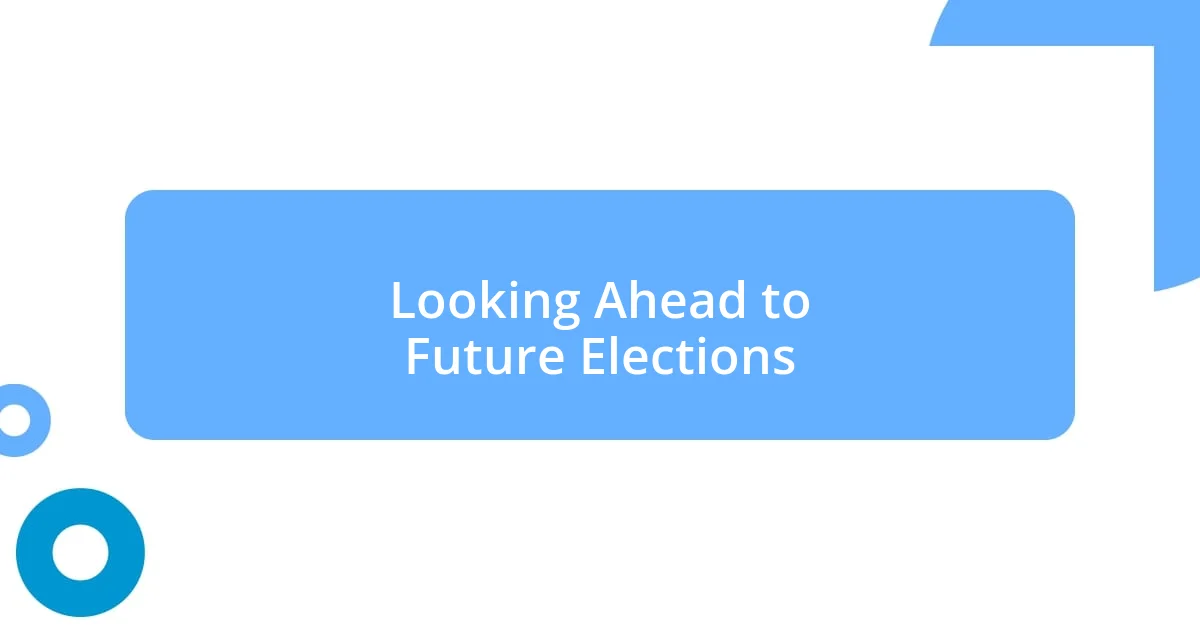
Looking Ahead to Future Elections
As I anticipate future elections, I find myself thinking about how important it is to continuously engage with the issues at hand. One experience that stuck with me was attending a town hall meeting a few months before an election. Listening to community members share their thoughts sparked something within me—a reminder that voters’ voices truly matter. Have you ever felt that rush of excitement when discussing critical issues just before casting your vote?
Looking ahead, I can’t help but consider the role of technology in the voting process. I remember using a new app to review candidates’ platforms before the last election; it made digesting information so much easier. This shows me that with each election, we have the potential to leverage tools that enhance our understanding and participation. What tools or resources do you find most helpful when preparing to vote?
Finally, I’m genuinely curious about how younger generations are becoming more engaged in the electoral process. Last election cycle, I had the pleasure of volunteering with high school students who were eager to learn about voting. Their passion was contagious, and it reminded me that our democracy thrives when we invest our time in educating future voters. How can we inspire them to not only vote but to become advocates for change in their communities?


